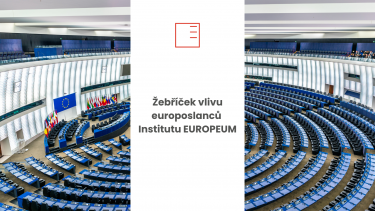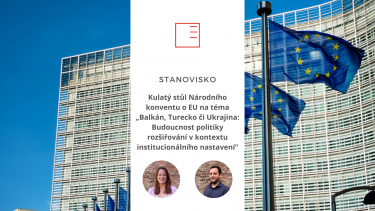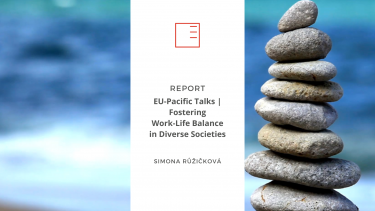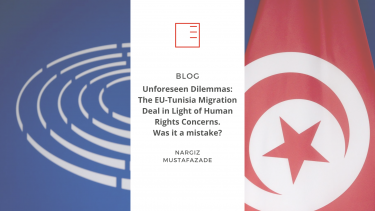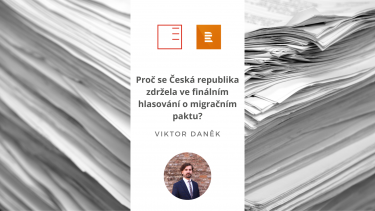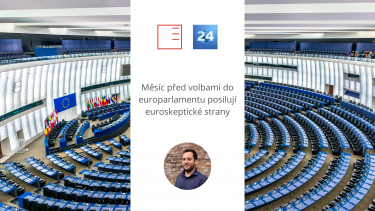EUROPEUM Institute's ranking of MEPs' influence
EUROPEUM Institute organized a survey among selected experts and stakeholders in European politics to evaluate the performance of current Czech MEPs. The performance of MEPs is difficult to evaluate because there is no completely objective set of criteria that would clearly show this. Therefore, EUROPEUM approached diplomats, officials, academics and other experts from the EU policy environment to compile its own ranking.
Show moreŽebříček vlivu europoslanců Institutu EUROPEUM
Institut EUROPEUM uspořádal anketu mezi vybranými experty a stakeholdery na evropskou politiku, která měla za cíl zhodnotit působení současných českých europoslanců. Činnost europoslanců je obtížné hodnotit, protože neexistuje zcela objektivní sada kritérií, která by to jasně ukazovala. Proto EUROPEUM při sestavování vlastního žebříčku oslovovalo diplomaty, úředníky, akademiky a dalšími experty z prostředí unijní politiky.
Show morePosition | National Convention Round Table on the EU
How to improve the EU enlargement process? How to ensure that the democratising effect of the accession process is sustained beyond the eventual accession to the EU? And are EU institutional reforms a necessary condition for EU enlargement? Answers to these and other questions are offered by the EUROPEUM Institute for European Policy's contribution to the National Convention on the EU's roundtable on Balkans, Turkey or Ukraine: the future of enlargement policy in the context of institutional settings.
Show more
Stanovisko | Kulatý stůl Národního konventu o EU
Jak zlepšit proces rozšiřování EU? Jak zajistit dlouhodobé působení demokratizačního efektu přístupového procesu i po případném vstupu do EU? A jsou institucionální reformy EU nezbytnou podmínkou pro rozšíření EU? Odpovědi na tyto a další otázky nabízí stanovisko Institutu pro evropskou politiku EUROPEUM ke kulatému stolu Národního konventu o EU na téma Balkán, Turecko či Ukrajina: Budoucnost politiky rozšiřování v kontextu institucionálního nastavení.
Show more
REPORT | EU-Pacific Talks: Fostering Work-Life Balance in Diverse Societies
Another in the series of EU-Pacific talks dealt with fostering work-life balance in diverse societies. The debate focused on examining current demographic trends and their social consequences in high-income countries in Europe and Southeast Asia. The discussion also touched on social systems, flexible job opportunities, and the pressures women face when balancing work and private life.
Show moreREPORT | EU-Pacific Talks: Fostering Work-Life Balance in Diverse Societies
Během další debaty ze série EU-Pacific Talks, kterou pořádal Institut pro evropskou politiku EUROPEUM, se účastníci zaměřili na podporu rovnováhy mezi pracovním a soukromým životem v různých společnostech. Účastníci v diskusi zdůraznili současné demografické trendy a jejich sociální důsledky. Diskuse se dotkla také sociálních systémů, flexibilních pracovních příležitostí a tlaků, kterým ženy čelí při slaďování pracovního a soukromého života.
Show moreBLOG | Unforeseen Dilemmas: The EU-Tunisia Migration Deal in Light of Human Rights Concerns. Was it a mistake?
Tunisia has become the main exit point for asylum seekers and refugees, especially those from sub-Saharan Africa. The EU, faced with a surge in arrivals to Lampedusa, has bolstered its cooperation with Tunisia, signing a Memorandum of Understanding with President Kais Saied. However, questions arise over the EU's handling of human rights abuses in Tunisia, reminiscent of past agreements with Turkey. Nargiz Mustafazade, a trainee in the Brussels office of EUROPEUM Institute, writes about this topic in her blog.
Show moreBLOG | Nepředvídaná dilema: Migrační dohoda EU-Tunisko ve světle obav o lidská práva. Byla to chyba?
Tunisko se stalo hlavním výchozím bodem pro žadatele o azyl a uprchlíky, zejména ty ze subsaharské Afriky. EU, která čelí nárůstu příchodů na Lampedusu, posílila svou spolupráci s Tuniskem a podepsala Memorandum o porozumění s prezidentem Kaísem Saídem. Nicméně vznikají otázky ohledně způsobu, jakým EU řeší porušování lidských práv v Tunisku, připomínající minulé dohody s Tureckem. Nargiz Mustafazade, stážistka bruselské kanceláře Institutu EUROPEUM, píše o této problematice ve svém blogu.
Show moreČRo | Czech Republic abstains in the final vote on the migration pact
The Migration Pact heads to its final vote in the Council of Ministers. The Czech Republic will abstain in this final vote. What is the process of approval within the European Union? What led to the change of position? And what are the implications for the EU of the just-approved migration pact? Viktor Daněk, Deputy Director of EUROPEUM Institute, comments for Czech Radio.
Show moreČT24 | Euroskeptic parties strengthen a month before the European Parliament elections
The European elections are about a month away. Czechs will vote for 21 of the 720 MEPs. This will be the first election since Brexit, the Covid-19 pandemic or the start of the Russian invasion of Ukraine. Turnout is expected to be higher than in the last elections five years ago, with right-wing and Eurosceptic parties strengthening. Žiga Faktor, deputy director and head of EUROPEUM Institute's Brussels office, described the possible reasons for daily broadcast of Czech TV.
Show more
Staroměstské náměstí 4/1
Prague 1 - Staré Město
110 00
tel.: +420 212 246 552
email: europeum@europeum.org
https://www.europeum.org
